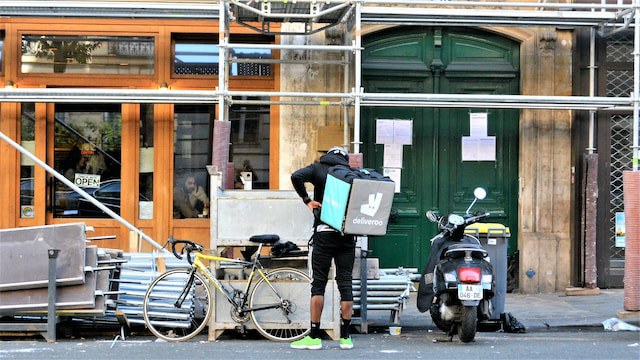
The Labour Section of the Milan Court ordered Deliveroo and Uber Eats, which has left the Italian market, to pay their riders social security and pension contributions for the period from 2016 to 2020 for Deliveroo and 2020 for Uber Eats.
If we look at the Italian courts' rulings on the platform economy in the past few months, they have been following a common direction, strengthening the protections of riders and overcoming those contractual schemes that would like to frame them as self-employed.
In July, following a ruling of the Turin Labour Court, Foodhino (Glovo) was ordered to give unpaid co to two riders. The entire shift in which workers are logged into the platform was considered work time and had to be paid consequently. (Also, read how Foodhino was found to track riders’ location outside working hours.)
Before that, in an unprecedented ruling for the Court of Appeal in Milan, Deliveroo had to uphold a previous ruling, determining that on-demand delivery riders must be employed under the terms and conditions of a standard employment relationship.
Even if we go further back in time, previous rulings had similar outcomes, and judges in other countries also supported the right of platform workers to greater stability. That’s the case in Ireland, Brazil, Spain, and the Netherlands.
But there’s a but. Actually, more than one.
As University of Amsterdam Professor Niels van Doorn underlines on Twitter, the verdict against Deliveroo Italy is “a great victory on paper, but in the Netherlands, Deliveroo didn’t wait for the final verdict and left the country. Will it leave Italy too?”
Court rulings are a good thing. However, the exit of a company from a country is never painless.
Deliveroo quit Germany in 2019 and Australia at the end of 2022 to “focus on other markets.”
In Italy, the Milan Court’s ruling, stating that the platform’s decision to lay off 4,000 riders in June 2023 as it closed its operations was illegal, came after Uber Eats had already stepped out from the country with all the imaginable consequences. The court said the dismissals must be revoked and talks activated with unions, However, in practice, riders find themselves jobless, despite the fact that the dismissals have been revoked. And looking at the future, which company will hire them? The question of what these workers will do remains, and their fate remains uncertain.
So it happens every time a gig company decides to exit a market, also considering that reaching a fair severance agreement is not always the case.
The dismissals of 300 Getir employees in Italy (including riders and administrative staff) have ended with a union agreement. It recognised the right to the unemployment benefit linked to workers’ length of service. But they were employees.
Van Doorn brings up another issue: “This industry was never meant to produce protected jobs.”
It’s also true that due to algorithms’ strict surveillance and arbitrary management, most riders cannot consider themselves as truly independent contractors or autonomous entrepreneurs. They are subordinated to the needs of a company and daily wear colours and branding of that company without any possibility of scheduling their activity autonomously.
Here is where things got complicated, to use a euphemism.
Therefore, the employment status is difficult to tackle when speaking of platform economy: is it always in line with the concept of platform work? Can platforms that hire their workers still call themselves platforms, or do they become something else? And how?
The employment issue is by far the most controversial aspect of the EU Platform Work Directive too, and is still under negotiation.
The entire debate should revolve around two elements: regulation and real gig workers’ conditions. Tim Christiaens says it well via SocialEurope: “Relying only on court cases or European legislation, without also promoting public support for enhanced labour rights, platform co-operatives, and tax justice for Big Tech, is a political risk. Only a broad coalition of governments, civil-society organisations, trade unions, and others can aggregate the resources required to shift the balance of power more durably in favour of gig workers.”
We do not want to diminish the value of the rulings in favour of riders. We want to share ideas and open a constructive debate.
